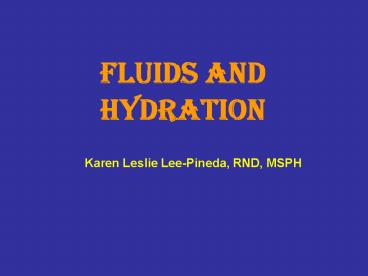Fluids and Hydration PowerPoint PPT Presentation
1 / 16
Title: Fluids and Hydration
1
Fluids and Hydration
- Karen Leslie Lee-Pineda, RND, MSPH
2
- Risks of Dehydration
- 1 Fluid loss ? increase body
- temperature during exercise
- 3 to 5 Fluid loss ? cardiovascular strain
- 7 Fluid loss ? athletes may collapse
3
- Signs and Symptoms of Dehydration
- Mild Dehydration
- Thirst, fatigue, decreased appetite, heat
- intolerance, light headedness, small amount
- and very concentrated urine
- Severe Dehydration
- Difficulty swallowing, shriveled and dry skin,
- stumbling, sunken eyes and poor vision,
- delirium, muscle spasms
4
- To check the hydration status
- color (clear, pale yellow)
- frequency
- volume of urine
- Do Not Rely On Thirst!
5
- Two Types of Dehydration
- Voluntary dehydration - athletes involved in
- sports with weight classification.
- Involuntary dehydration athletes who are unable
to access fluids.
6
Guidelines
- 2 to 3 hours 2 to 3 cups of fluids
- 1 to 2 cups 10 to 20 minutes
- ½ to 1 cup 15 to 20 minutes
- 2 to 3 cups every pound of lost weight
7
- Estimating Fluid Loss
- Weigh yourself before and after
- - wear minimal clothing
- - empty your bladder before weighing
- - weight change reflects total fluid loss
8
- Electrolytes
- Fluid balance
- Muscle contraction
- Major electrolytes lost in sweat Sodium
Chloride - Any disturbance in the balance of electrolytes
- in body fluid could interfere with performance.
9
- Fluids To Be Avoided
- Carbonated Drinks may cause stomach
- upset
- 2. Alcoholic Beverages sedative, diuretic,
- depressant
10
- 3. Caffeinated Drinks
- Diuretic Caffeines diuretic effect
appears - insignificant .
- May cause GI problems.
- Caffeine is no longer banned by the World
- Anti Doping Agency.
11
Negative Effects of Caffeine on the body
- Irritate the stomach lining
- Disrupt sleeping
- Cause diarrhea
- Accelerate dehydration
- Calcium depletion
- Increase nervousness
- Increase heart rate
12
Positive Effects of Caffeine on the body
- Body uses free fatty acids
- Increase alertness
- Muscle contraction
- Caffeine capacity to bind to adenosine receptors.
13
Fluid Replacement Beverage
- tastes good
- does not cause GI distress
- promotes fluid absorption
- maintains fluid balance
- provides energy
14
SPORTS DRINKS
- carbohydrates (6-8)
- minimal amount of sodium
- during exercise event longer than 60 to 90
minutes high intensity and endurance event - should not be diluted with water
15
- Water and Other Beverages
- 1. Water low intensity or short duration
exercise. - 2. Sports Water moderate exercise of less than
an hour.
16
- 3. Soft Drink/Fruit Juice too high in
- carbohydrate.
- 4. Energy Drinks not the same with sports
drinks. Some side effects dehydration, - rapid heart rate, nervousness, irritability
- Energy shot sold in smaller bottles,
contains same total amount of caffeine, vitamins
other ingredients with energy drinks.

